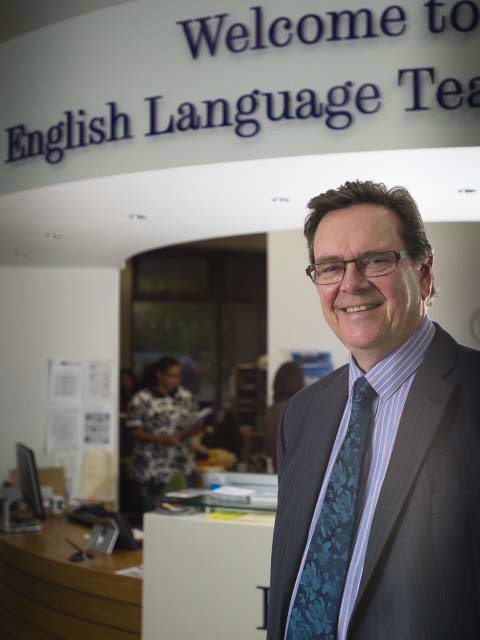Richard Simpson shares with Melanie Butler the secrets of running a mega-language centre powered by academic attitudes
What was the situation like when you first arrived at the English
Language Teaching Centre (ELTC) at Sheffield 24 years ago?
Richard: I was teacher number five. Including the director and
administrator there were seven of us, plus some hourly-paid teachers.
And now?
Richard: Including teachers who choose to teach part-time we have the equivalent of 100 full-time permanent teaching staff year-round. In the summer the number doubles.
And the number of students?
Richard: In 2018 we hit 2,599 at peak.
That’s the size of a small chain of language schools. What is that like?
Richard: Nerve racking, a logistical challenge. We have the advantage over some summer school operators of running a year round operation in the same location. We have staff planning it all year and we can call on the resources of the university: accommodation, libraries, catering. But scaling up means avoiding chaos: timetabling, inducting staff, even finding enough classroom can be difficult.
And that’s not to mention hiring 100 diploma qualified summer teachers. How do you handle that?
Richard: It’s about the complete deal, proper wages, a week’s paid induction, lots of support. The first thing I did when I took over the centre was to move hourly-paid staff onto contracts.
Unusually, at Sheffield all the English teaching at the private sector pathway college is done by ELTC. What is your relationship with your partners?
Richard: We have a symbiotic relationship with our pathways partners. We take their students if their language levels are too low. They take our teachers who are highly experienced, fully qualified and on university contracts. We work well together.
Logistics aside, what are the pedagogic challenges you face in a University language centre?
Richard: I am interested in the whole area of academic language and literacies, it is the subject of my doctorate, my EdD which I am doing by distance in my spare time. The question is, in a very large centre like ours should we take a more purist approach, looking at the discourse pattern in specific subject areas or a more generalist one? Broadly speaking, in the pre-sessional we teach more general academic language, getting them across the threshold. But for in-sessional courses we move from the general to specific. Where we can get the buy-in from the academics, we run courses embedded into the degree programme, attended by home students, too. Co-taught with content lecturers. That’s the gold standard.
“The very next year the internet was invented. And the world exploded.”
You are also very passionate about the use of technology in language teaching and learning. Tell us about the range of technology you have incorporated at ELTC.
Richard: I do love the technology. I did a Masters in CALL for TEFL in 1993 – we thought we were at the cutting edge. The very next year the internet was invented. And the world exploded.
We have incorporated technology throughout ELTC, in our teaching, our training, the building itself. We have teachers working online with at-risk academics in refugee camps through the charity CARA, and even offer an online course teaching teachers how to use technology in their teaching! Do University language centres now straddle the divide between the profession and the industry?
Richard: In the North of England, there has always been good cooperation between the various sectors. We all had to sell the North as a destination and the English UK regional groups were developed following our lead. I also feel that university centres should be accredited both by BALEAP, the EAP focused scheme, and by the British Council. I am a board member of English UK, the industry association, and am trying to encourage Universities to get involved.
So what advice would you give your younger self, arriving in a little language unit?
Richard: If I could send him a message in a time capsule it would be that same message: get involved.





